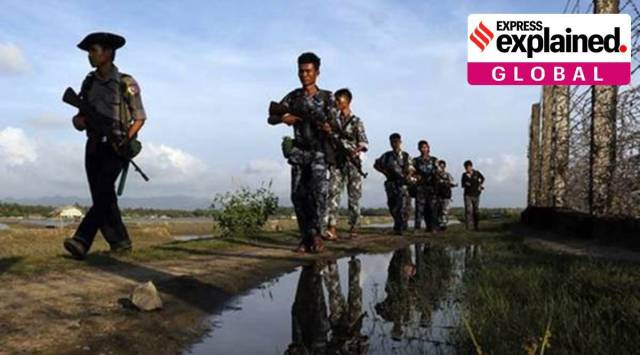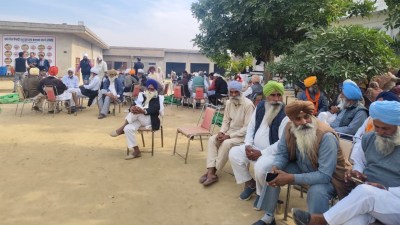The Rohingya and Myanmar’s planned election as ICJ keeps heat on junta
The ICJ has given Myanmar only a month's reprieve, and scheduled the next hearing for May 24. In July 2022, the court had rejected Myanmar's objections to the case brought by The Gambia, and asked it to file a reply by April 24, 2023.
 The case relates to the Myanmar military’s “clearing” operations in 2017 in Rakhine state, in which many Rohingya were killed or subjected to atrocities, and lakhs were forced to flee to Bangladesh.
The case relates to the Myanmar military’s “clearing” operations in 2017 in Rakhine state, in which many Rohingya were killed or subjected to atrocities, and lakhs were forced to flee to Bangladesh. Earlier this month, the International Court of Justice at The Hague rejected the Myanmar junta’s appeal for a 10-month reprieve to file a counter-memorial — or reply — to The Gambia’s case that Myanmar was in breach of the international Genocide Convention.
The case relates to the Myanmar military’s “clearing” operations in 2017 in Rakhine state, in which many Rohingya were killed or subjected to atrocities, and lakhs were forced to flee to Bangladesh.
The ICJ has given Myanmar only a month’s reprieve, and scheduled the next hearing for May 24. In July 2022, the court had rejected Myanmar’s objections to the case brought by The Gambia, and asked it to file a reply by April 24, 2023.
On March 14 this year, Myanmar asked for time until February 24, 2024 citing, among other things, the junta’s own coup, the “limited” resources at its disposal, the time needed to translate case documents and obtain statements from witnesses living in camps in Bangladesh, and the Covid-19 pandemic.
The case has been before the court since November 2019.
Rohingya back on table
With the ICJ deadline looming, the military regime has been in talks with Bangladesh for repatriation of Rohingya refugees, possibly hoping that this might buy it some time with the court, and make a favourable impression on the international community.
A 22-member Myanmar junta delegation landed in Bangladesh’s Cox Bazar, where over a million Rohingya refugees have taken shelter, on March 15 — just the day after it asked the ICJ for more time to respond to The Gambia.
Bangladeshi media reported that the Myanmarese delegation would verify the identities of 429 Rohingya as part of a “pilot project” for repatriation.
However, Myanmar’s less than half-hearted attempts at taking back a handful of Rohingya are matched by the refugees’ reluctance to give up the safe haven that Dhaka has provided for an uncertain future in their home country. The Rohingya want a dignified return, with concrete assurances of citizenship — which Myanmar has not so far given.
Push from the Chinese
Earlier in 2018, a China-brokered repatriation agreement too had failed due to Rohingya reluctance. Under that plan, drawn up before the Myanmar military’s February 1, 2021 coup, a few families had been identified for repatriation, but word spread that they would return not to their villages but to prison-like camps. The plan never took off.
Beijing was behind last month’s effort too, Bangladeshi media reported. Two days prior to the junta delegation’s Bangladesh visit, the military regime in Naypyidaw took diplomats of Bangladesh, India, China, and five other countries to Rakhine state, and showed them around temporary camps in Sittwe and Maungdaw.
While the Myanmar delegation was still in Bangladesh, the UNHCR put out a statement that it was not part of the ongoing discussions — and that while everyone had the right to return home, it had to be voluntary and based on informed choice.
The agency said conditions in Rakhine were not yet conducive for the return of the refugees, and reminded Bangladesh that it had “consistently reaffirmed its commitment to voluntary and sustainable repatriation since the onset of the current crisis”.
The democracy movement
With virtually the entire Rohingya population forcibly displaced from Myanmar, the community has been cut off from the pro-democracy movement that continues to challenge the junta on a daily basis through armed resistance on the ground.
In Rakhine, the Arakan Army, an insurgent group of the ethnic Buddhist Rakhine, has been fighting the Myanmar military, but it has not joined the pro-democracy movement.
The “National Unity Government”, formed by pro-democracy activists including elected candidates of the usurped 2020 Myanmar parliamentary election and members of ethnic organisations, declared last June, on the fifth anniversary of Myanmar’s “clearance” war against the Rohingya, that after it removes the military dictatorship, it will restore full citizenship to members of the community as part of its commitment to establishing a democratic, federal, rights-based polity.
The NUG, led by “acting President” Duwa Lashi La, a member of the Chin ethnic minority, calls itself the legitimate government of Myanmar — and has demanded that the ICJ should deal with it in the Rohingya matter, and not the “illegal” junta government. The NUG is not recognised by the international community, but some countries engage with it.
The leader of the junta, Senior General Min Aung Hlaing, has said he will crush the resistance by the People’s Defence Force, the NUG’s armed wing. He is determined to hold an election, apparently with the objective of claiming that the regime is “elected”, although the plan has been dismissed as a “sham” by the NUG and international experts.
No dates for the election have been set yet, but it is likely next year. The junta also plans to hold a census before the election. Most Rohingya now live outside Myanmar, and they will be excluded.
Signal from air strikes
Last week’s air strikes on a gathering at the opening of a new office by local pro-democracy forces in Pazi Gyi village in the Sagaing region, is now reported to have killed 170 people, including many women and children. It is the worst death toll in a single incident in the two-year-long war, and an indication that wherever ground conditions favour the armed resistance, the junta will likely rely on air strikes.
In such violent and chaotic circumstances, for the lakhs of Rohingya forced to flee to Bangladesh after being let down by the democratically elected National League for Democracy government — its leader Aung San Suu Kyi appeared before the ICJ to defend the military — the promise of citizenship by the NUG means nothing yet.
- 01
- 02
- 03
- 04
- 05






































